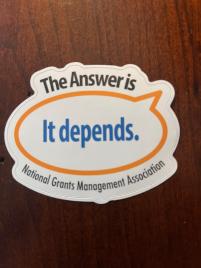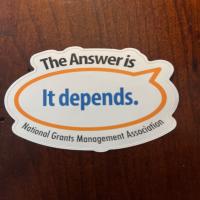What is this Grants-related Post About? It Depends!

We found it very interesting, if not somehow fitting, that the National Grants Management Association was giving away stickers during its Annual Grants Training conference last week in Washington, D.C., that simply said, “The answer is … It depends.” Not only can administering a program receiving federal financial assistance be incredibly complex, it doesn’t help that each individual grant is different, making it nearly impossible to provide a hard and fast answer to every grant-related question.
Because many factors — ranging from federal statutes that authorized the grant, to state and local rules and regulations, to internal policies — must be considered when assessing a question about a grant, nailing down an answer to every question involved with a grant may prove elusive. Not to mention the fact that federal awarding agencies may have different interpretations of Office of Management and Budget (OMB) guidance when it pertains to a specific award.
We at Thompson Grants often run into this situation when answering Ask-the-Expert questions submitted by subscribers on our website. In particular, because a topic such as time and effort requires recipients to develop internal controls and policies to ensure that they are documenting the effort employees work on a grant program, this is one area that we can often see a response such as “it depends.
For example, a few years back, we received a subscriber question from a community college stating that some faculty members (who are also principal investigators (PIs) in grants) have two contracts: a day contract that fulfills their teaching and/or administrative duties, and an evening hourly rate contract, which addresses teaching of evening classes. The PIs worked on the grants after school when the evening contract kicked in. The subscriber asked how time and effort would be addressed in this case?
We responded to state that this question had a few unknowns that would impact the situation, so our answer was “it depends.” However, as a general time and effort rule, a person’s time can never exceed 100%, regardless of how many contracts are in place or number of hours worked, but what comprises that 100% can legitimately vary depending upon the duties performed by the individual during a given period of time.
Our response went on to state that it was a little challenging when dealing with time and effort of faculty vs. staff. For example, what written college policies/procedures are in place to define a “full-time” faculty member? Most community colleges express faculty contracts in terms of teaching load: e.g., a full-time faculty member works 40 hours per week, comprised of 15 contact hours per week teaching in the classroom (i.e., 53-credit hour courses during the fall or spring term), 15 office hours per week for meeting with students, grading papers, etc., and 10 hours per week participating in institutional committees or other administrative-type work in support of the college. Based on the wording of the question, we had to assume that the “evening hourly rate contract” was parallel to what could be deemed an “overload” contract, which is when a full-time faculty member agrees to teach classes above and beyond his/her “regular” (e.g., 40-hour) workload.
Further questions causing the “it depends” answer included: What primary duties are being performed as part of the “day” and “evening” contracts? Is the faculty member teaching classes, or is he/she performing other duties (e.g., curriculum development)? If the faculty member is performing administrative-type duties in support of the grant as opposed to teaching, how does the institution determine (and track) equivalent hours worked? Is the faculty member being “released” or “reassigned” from his/her regular duties to perform grant-related duties, or is he/she being paid additional money for working additional hours? If he/she is being paid additional money, how was that pay rate determined?
Sitting in various breakout sessions, we often heard an “it depends” answer from presenters when asked site-specific question from attendees. It’s definitely a familiar refrain.
During a plenary session presentation, Deidre Harrison, deputy controller for OMB, told attendees that as OMB prepares to finalize revisions to the uniform guidance, it is attempting to better clarify the document to avoid various interpretations of the guidance by awarding agencies, which may help reduce some of “it depends” answers going forward. We certainly hope so.
Join us for our following Thompson Grants events:
Thompson Grants Workshop: Indirect Costs| March 14, 2024 | Virtual Event
Thompson Grants Workshop: Procurement | May 23, 2024 | Virtual Event



